Unit 8 Detective stories 语言要点和语法拓展 课件(58张)
文档属性
| 名称 | Unit 8 Detective stories 语言要点和语法拓展 课件(58张) | 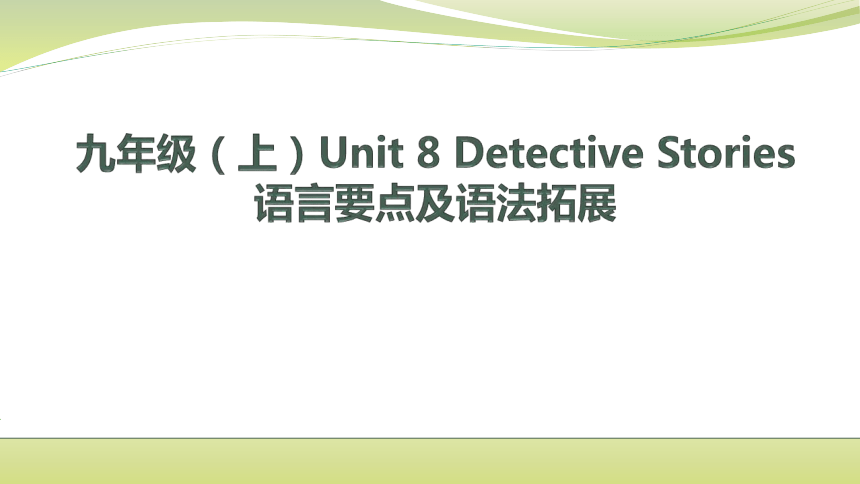 | |
| 格式 | zip | ||
| 文件大小 | 230.1KB | ||
| 资源类型 | 教案 | ||
| 版本资源 | 牛津译林版 | ||
| 科目 | 英语 | ||
| 更新时间 | 2020-05-19 16:16:45 | ||
图片预览

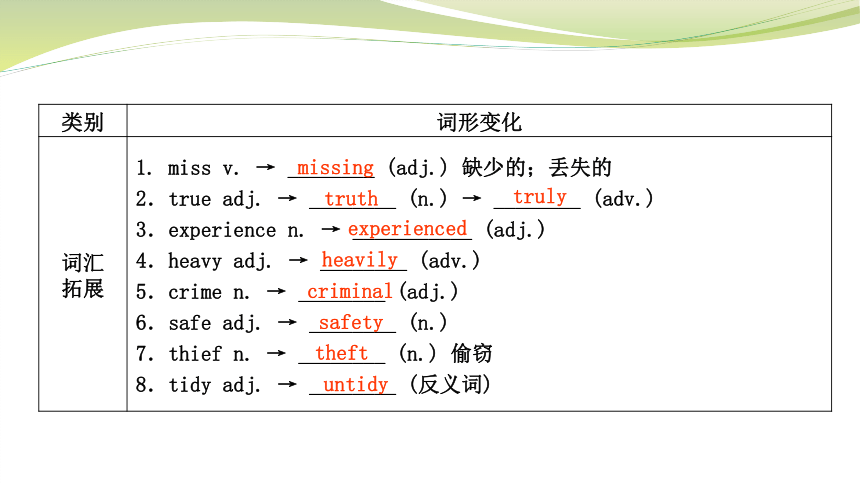
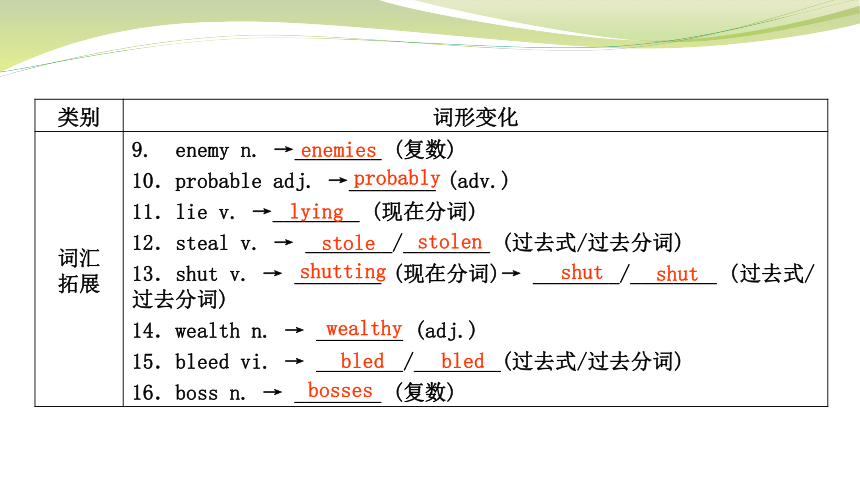
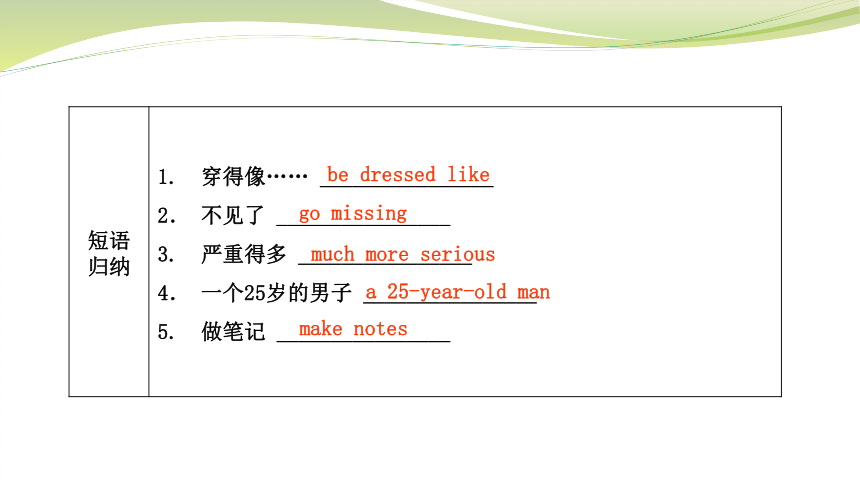
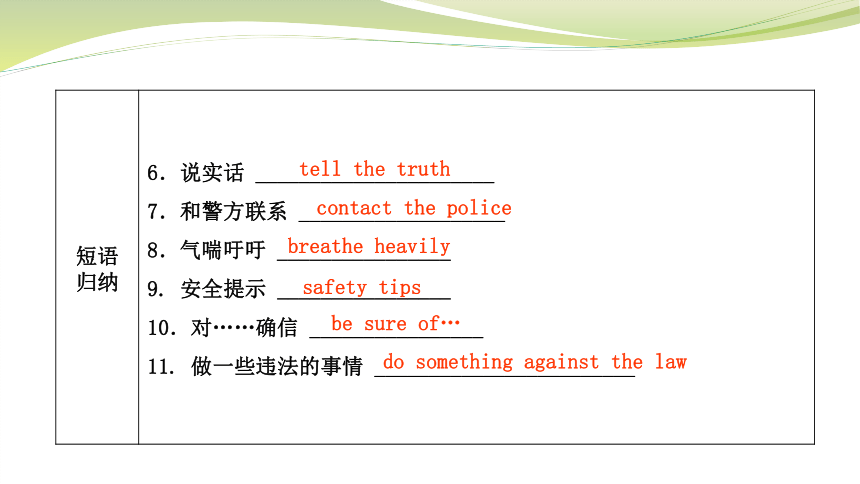
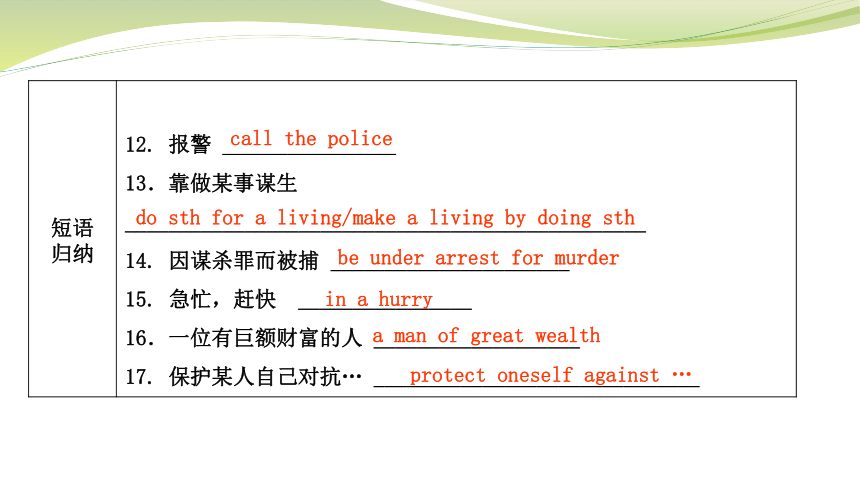
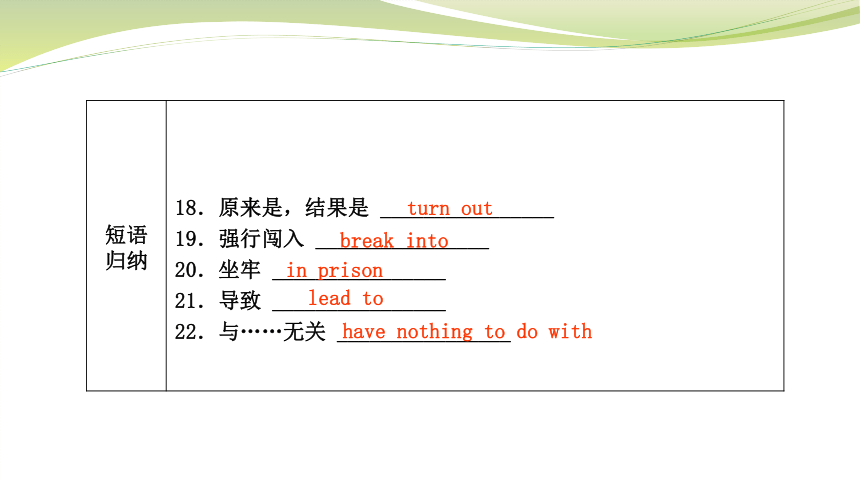
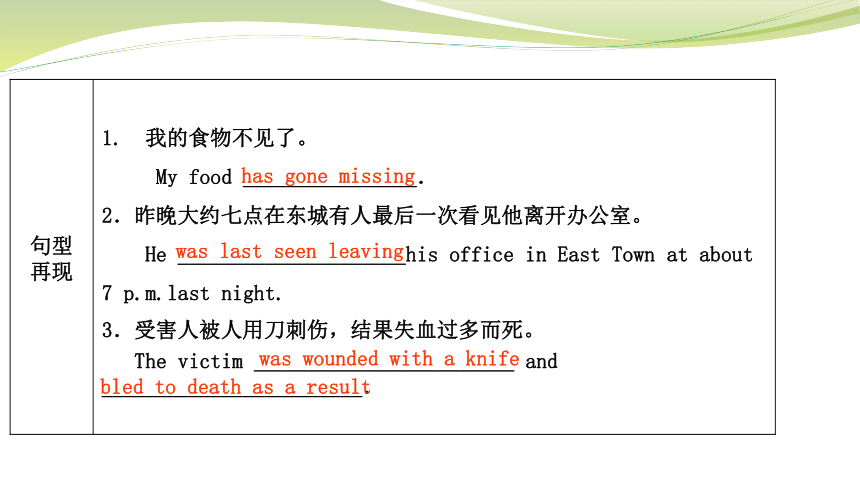
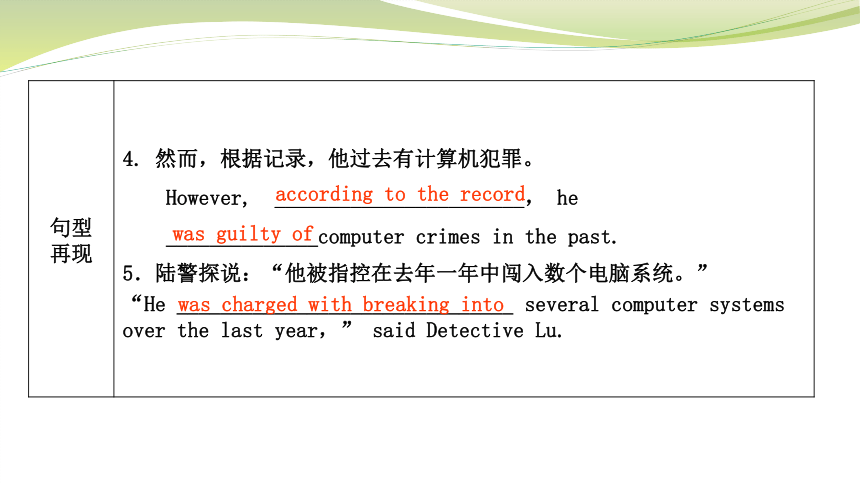
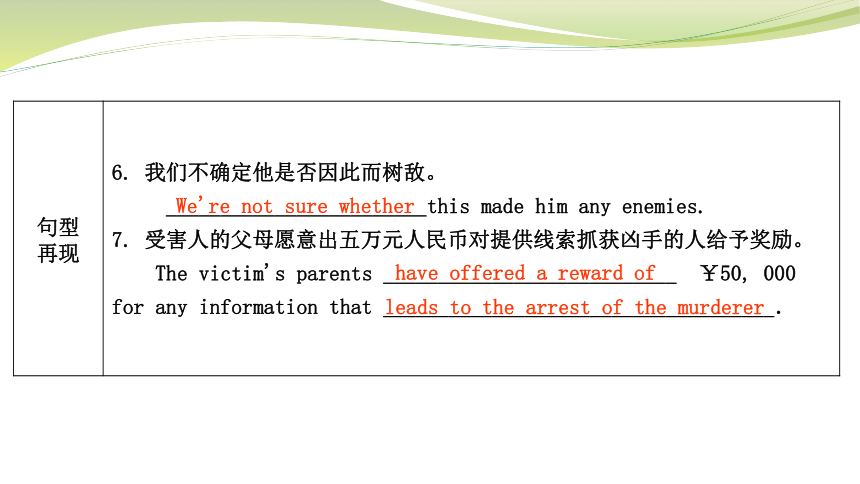
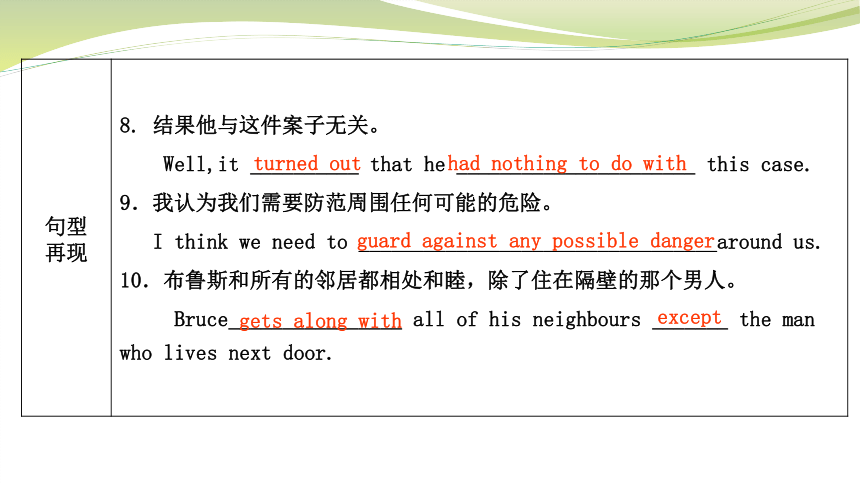
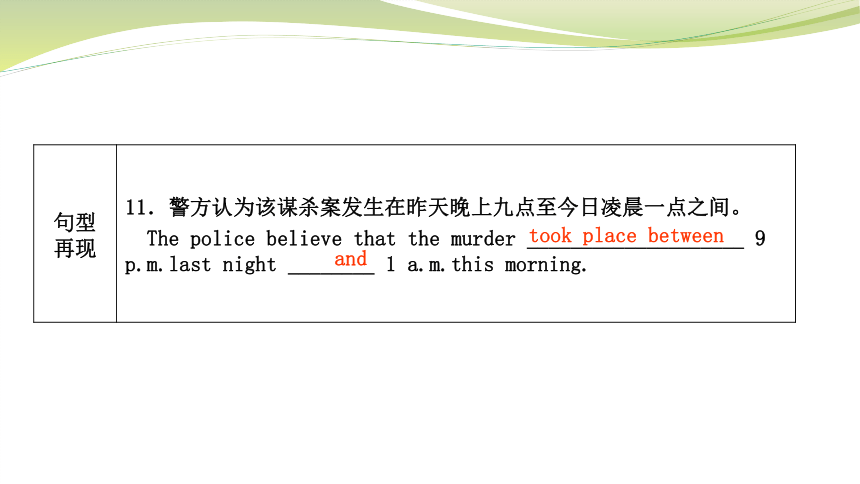
文档简介
(共58张PPT)
九年级(上)Unit 8 Detective Stories
语言要点及语法拓展
类别 词形变化
词汇
拓展 1. miss v. → ________ (adj.) 缺少的;丢失的
2.true adj. → ________ (n.) → ________ (adv.)
3.experience n. → ___________ (adj.)
4.heavy adj. → ________ (adv.)
5.crime n. → ________ (adj.)
6.safe adj. → ________ (n.)
7.thief n. → ________ (n.) 偷窃
8.tidy adj. → ________ (反义词)
truth
experienced
missing
heavily
criminal
safety
theft
truly
untidy
类别 词形变化
词汇
拓展 9. enemy n. →________ (复数)
10.probable adj. →________ (adv.)
11.lie v. →________ (现在分词)
12.steal v. → ________/________ (过去式/过去分词)
13.shut v. → ________ (现在分词)→ ________/________ (过去式/过去分词)
14.wealth n. → ________ (adj.)
15.bleed vi. → ________/________(过去式/过去分词)
16.boss n. → ________ (复数)
lying
probably
stole
enemies
stolen
shutting
shut
shut
wealthy
bled
bled
bosses
短语
归纳 1. 穿得像…… ________________
2. 不见了 ________________
3. 严重得多 ________________
4. 一个25岁的男子 ________________
5. 做笔记 ________________
go missing
much more serious
a 25?-year?-old man
make notes
be dressed like
短语
归纳 6.说实话 ______________________
7.和警方联系 ___________________
8.气喘吁吁 ________________
9. 安全提示 ________________
10.对……确信 ________________
11. 做一些违法的事情 ________________________
tell the truth
contact the police
breathe heavily
safety tips
be sure of…
do something against the law
短语
归纳 12. 报警 ________________
13.靠做某事谋生
________________________________________________
14. 因谋杀罪而被捕 ______________________
15. 急忙,赶快 ________________
16.一位有巨额财富的人 ___________________
17. 保护某人自己对抗… ______________________________
call the police
do sth for a living/make a living by doing sth
be under arrest for murder
in a hurry
a man of great wealth
protect oneself against …
短语
归纳 18.原来是,结果是 ________________
19.强行闯入 ________________
20.坐牢 ________________
21.导致 ________________
22.与……无关 ________________
turn out
break into
in prison
lead to
have nothing to do with
句型
再现 1. 我的食物不见了。
My food ________________.
2.昨晚大约七点在东城有人最后一次看见他离开办公室。
He _____________________his office in East Town at about 7 p.m.last night.
3.受害人被人用刀刺伤,结果失血过多而死。
The victim ________________________ and ________________________.
has gone missing
was last seen leaving
was wounded with a knife
bled to death as a result
句型
再现 4. 然而,根据记录,他过去有计算机犯罪。
However, _______________________, he
______________computer crimes in the past.
5.陆警探说:“他被指控在去年一年中闯入数个电脑系统。”
“He _______________________________ several computer systems over the last year,” said Detective Lu.
according to the record
was guilty of
was charged with breaking into
句型
再现 6. 我们不确定他是否因此而树敌。
________________________this made him any enemies.
7. 受害人的父母愿意出五万元人民币对提供线索抓获凶手的人给予奖励。
The victim's parents ___________________________ ¥50, 000 for any information that ____________________________________.
We're not sure whether
have offered a reward of
leads to the arrest of the murderer
句型
再现 8. 结果他与这件案子无关。
Well,it __________ that he ______________________ this case.
9.我认为我们需要防范周围任何可能的危险。
I think we need to _________________________________around us.
10.布鲁斯和所有的邻居都相处和睦,除了住在隔壁的那个男人。
Bruce________________ all of his neighbours _______ the man who lives next door.
turned out
guard against any possible danger
gets along with
except
had nothing to do with
句型
再现 11.警方认为该谋杀案发生在昨天晚上九点至今日凌晨一点之间。
The police believe that the murder ____________________ 9 p.m.last night ________ 1 a.m.this morning.
took place between
and
重点词汇突破
1. truth n. 事实,真相
(1) truth是由形容词true变化而来。 speak/tell the ______说实话。如:
He was afraid to tell her the truth. 他害怕告诉她真相。
To tell the truth, he is getting on really well with his classmates.
说实话,他与同学相处得真不错。
(2) true,形容词,意为“真实的”; truly,副词,意为“真实地,真诚地”。
come true 实现,成真。如:
This is a true story. 这是一个真实的故事。
What he said is true. 他所说的是真的。
He knew he had behaved badly and he seemed truly sorry.
他知道自己表现得不好,并且似乎真的很懊悔。
truth
① A _______ friend reaches for your hand and touches your heart.
② The ________(true) is that I also have five more minutes to watch him.
即时练
true
truth
2. somewhere adv. 在某处
(1) somewhere 作副词, 经常用于肯定句中。如:
Little Tom must be somewhere near here. 小汤姆一定在这附近的某个地方。
(2) _____________ 还可以作代词,意为“某地”。如:
The man has to find somewhere to live. 这个人不得不找个地方住。
(3)当有形容词修饰 somewhere, anywhere 或 nowhere 等不定副词时,形容词应该放在不定副词之后,如 somewhere else, somewhere quiet 等。如:
I'm going somewhere else this evening. 今晚我要去别的(某个)地方。
My grandparents would like to live somewhere quiet.
我的祖父母想住在(某个)清静的地方。
somewhere
① It seemed that we had met _______________(某处) in the downtown of Suzhou.
② 暑假我想去有趣的地方参观。
I would _______ to visit _____________ interesting in the summer vacation.
即时练
somewhere
like
somewhere
3. suppose vt. 猜想,假定,料想
__________意为“猜想,假定,料想”。
suppose to do sth. 假定做某事;
be supposed to do sth. 应该做某事;
suppose sb. + adj.意为“认为某人……”;
suppose还可接that从句。如:I suppose we'll go there next week. 我猜想我们下周将去那儿。
We all suppose him clever. 我们所有人都认为他很聪明。
You don't mind my smoking, I suppose.
我想你不会介意我抽烟的。
在英语中,含有suppose的句子用否定主句谓语的方式来否定后面宾语从句的内容,这种语言现象叫作否定前移,在这种用法中, suppose表示“想,认为,猜想,料想”。如:
I don't suppose I'll trouble you again. 我想我不会再麻烦你。
suppose
① We are ____________ to behave properly in public places.
② 作为青少年,我们应该学会如何照顾自己。
As teenagers, we __________________(suppose) learn how to look after ourselves.
( )③ — I always can't help ________ TV plays with my mobile phone when I'm studying.
— It's not a good habit. You are supposed to ________ it.
A. watching; correcting B. watch; correct
C. watch; correcting D. watching; correct
即时练
supposed
are supposed to
D
4. hurry n. 急忙,匆忙
hurry,名词,意为“急忙,匆忙”;________还可作动词,意为“匆忙;催促;赶紧”。
hurry
be in a hurry to do sth. = hurry to do sth. = do sth. in a hurry 匆忙做某事
hurry off 匆忙离开
no hurry 不忙,不必着急,有充裕的时间
hurry up 快点,赶紧做
① He left home in a ________(匆忙) and forgot to turn off the light this morning.
( )② (2015·齐齐哈尔)________!There is little time left.
A. Hurry up B. Don't worry C. Take it easy
即时练
hurry
A
5. safety n. 安全,保险
safety是由safe变化而来, safe作形容词,意为“安全的;安然无恙的;可靠的;谨慎的”; safe作名词,意为“保险箱”;_________,副词,意为“安全地,平安地;可靠地”。如:
It is not safe to drive like that. You must slow down.
那样开车是不安全的。你必须减速。
Please put the money in the hotel safe for safety.
为了保险起见,请把钱放到宾馆的保险箱里。
The pilot landed the plane safely.
飞行员使飞机安全降落。
safely
① 经常对孩子们进行道路安全教育以避免交通事故的发生。
Young children are often taught road ________ to ________ traffic accidents.
② For your ________(safe), smoking is not allowed during the whole flight.
即时练
safety
avoid
safety
易混词汇
bleed与blood
1. bleed作动词,意为“流血”,过去式和过去分词是______,现在分词是bleeding。bleed to death 意为“流血致死”。如:
His nose bled badly. 他的鼻子流血很多。
2. blood是不可数名词,没有复数形式,其本意为“血,血液”;还可引申为“血统,亲属,血气,脾气”。如:
Your blood pressure is only a little high.
你的血压只是稍微高一点儿。
bled
① Laurie was cut and ______(bleed), but she was safe.
② Jim has got a ________(血) cancer. Let's raise some money for him.
即时练
bled
blood
核心句型
1. This is much more serious. 这严重得多。
_____________serious 严重得多。在比较级前常用much来修饰,起加强语气的作用。下列副词及副词短语可作比较级修饰语,以加强或削弱比较程度。
(1) a little, a bit表示“稍微,有些”;
(2) much, a lot, far等表示很大程度,常译为“……得多”;
(3) still, even表示“更”。
如:She is much cleverer than I am. 她比我聪明得多。
You must work much harder. 你必须更努力地工作。
much more
① The exam is very important to us, so we must take it ____________(严肃地).
( )② (2016·泰安)We all like Lucy as she is always thinking ________ of others than herself.
A. less B. much more C. much D. better
( )③ (2016·贵港)After practising speaking English for several months, I can speak much ________ now.
A. well B. better C. best D. good
即时练
seriously
B
B
2. My food has gone missing.我的食物不见了。
(1) go missing意为“失踪”,_________是形容词,意为“找不到的;失踪的”。go后接形容词作表语时,通常表示“变成或处于某种(不好的)状态”。如:
Food goes bad easily in hot weather.天气热食物容易变质。
Has anything gone wrong with the machine?机器出毛病了吗?
(2) miss作动词,意为“想念;错过”。如:
I'm sure that everybody will miss him very much.
我确信每个人都会非常想念他。
I was late because I missed the bus.
我迟到了,因为我错过了公共汽车。
missing
( )① If Nick ________ home too late, he ________ his favourite cartoon.
A. gets; misses B. gets; will miss
C. will get; misses D. will get; will miss
② 如果你现在不出发,你就会错过末班公交车。
____ you don't leave now, you ___________ the final bus.
即时练
B
If
will miss
3. The victim was wounded with a knife and bled to death as a result.
那位受害人被刀所伤,结果失血过多死亡。
(1) __________在此处作动词,意为“受伤”; wound还可以作名词,意为“伤口”。
如: a gun wound枪伤;
The soldier was wounded in the arm. 这名士兵的胳膊受伤了。
(2) as a result是固定短语,意为“因此,结果”,它可放在句首、句尾,也可放在句子中间。
wound
The victim was attacked with a knife, and as a result, he bled to death.
雨下的很大,因此我们不能出去。
It’s raining hard, and as a result, we can’t go out.
We can‘t go out as a result of the heavy rain.
as a result of… =because of
( )① ________ a result, she became very light and flew up to the moon.
A. As B. With C. In
② He had to walk with the help of two walking sticks ________________(由于) the disease he caught when he was a child.
即时练
A
as a result of
4. “He was charged with breaking into several computer systems over the last year,” said Detective Lu. 陆警官说:“他被指控在过去的一年中侵入数个电脑系统。”
(1) be _________ with意为“被指控”,其主动语态为charge sb. with ...,
意为“指控某人……”。
The police charged him with murder.
警察指控他有谋杀罪。
charged
(2) break into 意为“闯入;侵入;强行进入”,后带宾语。如:
Someone broke into the shop and took everything of value.
有人闯进了商店,把所有值钱的东西都拿走了。
break out 突然开始;爆发 break up 粉碎;破碎
break down 破坏,坏掉 break the record 打破纪录
( )① — What shall we buy for Lucy as a present?
— Let's buy a new bike for her. Her bike ________ from time to time after all.
A. breaks down B. breaks into
C. breaks out D. breaks up
② Su Bingtian ________(打破) his own record in men's 100?metre race. He became the first Asian?born person.
即时练
A
broke
5. ...it turned out that he had nothing to do with this case.
……事实证明他跟这次案件无关。
___________意为“原来是,结果是”。
have nothing to do with意为“与……无关”;
have something to do with 意为“与……有关”。
turn out
( )① If the weather ________ to be rainy, we may have to cancel the sports meeting.
A. runs out B. breaks out C. finds out D. turns out
② 结果证明,谋杀案和那个工程师无关。
It turned out that the engineer ________________________ the murder.
③ 这些疾病与噪音污染无关。
The diseases ____________________________________________.
即时练
D
had nothig to do with
have nothig to do with noise pollution
6.The victim’s parents have offered a reward of ¥ 50,000 for any information
that leads to the arrest of the murderer.
同义句转换:
The accident caused a lot of trouble.
The accident a lot of trouble.
连词成句:
1.his, in, wisdom, to, his, this, led, area, success
2.rest, often, little, too, leads, to, illness
His wisdom led to his success in this area.
Too little rest often leads to illness.
led
to
语法拓展
定语从句
在英语中修饰名词或代词的句子叫作定语从句。定语从句通常由关系代词或关系副词引导,它们在定语从句中充当一定的成分,常见的引导定语从句的关系代词有who, which, that等。
当先行词指人时,关系代词可以用 that 或______。如:
The girl who/that is behind the tree is Kate. 树后面的那个女孩是凯特。
I helped an old man who lost his way yesterday. 昨天我帮助了一位迷路的老人。
2. 当先行词指物时,关系代词可以用 that 或_______ 。如:
He bought a new TV which/that was made in Japan.他买了一台日本制造的新电视机。
who
which
Work out the rule:
I have an apple.
The apple is red.
I have an apple
that is red.
主语
主语
关系词that在定语从句中作主语时不能省掉。
如何使用关系代词 that / which / who / whom?
I like some friends.
Some friends like sports.
I like some friends
who like sports.
主语
主语
/ that
关系词who /that 在定语从句中作主语时不能省略。
I like the girl.
You are talking to the girl.
I like the girl
who(m) you are talking to .
宾语
宾语
/that
关系词who /that在定语从句中作宾语时可以省掉。
Conclusion
1.关系代词who/which/that在定语从句中可以充当主语或宾语。
2.关系代词who/which/that在定语从句中作宾语时,可以省略,做主语时,不能省略。
难点(1):区分who, whom
1. The man _____ talked to you just now is a worker.
2. The foreigner ________ visited our class yesterday
is from Canada.
3. I’d like to see the boy _____________ you talked about .
4. The girl _______________ we saw yesterday is
John’s sister.
who
who
who / whom
who / whom
who / whom代替人,在从句中充当宾语
难点(2):关系代词在定语从句中作宾语时可省略,作主语则不可。
1. Did you read the book ________ I lend to you ?
A. whose B. / C. who D. what
2. Did you read the book _______was popular at
the moment.
A. that B. / C. who D. what
?
B
A
指人 指物 主语 宾语
that
which
who
whom
Summary 关系代词的用法
√
√
√
√
√
√
√
√
√
√
√
√
×
×
×
×
How to use ‘Relative pronouns’?
何时可以省略?
做宾语时可以省略
小结:
that- 既可指人,也可指物,作主语,不能省略;作宾语,可以省略。
which-指物,作主语,不能省略;作宾语,可以省略.
who- 指人,作主语,不能省略;作宾语,可以省略,(常用whom)
who- 指人,作主语,不能省略;作宾
语,可以省略,(常用whom)
将两个句子合并成定语从句:
Match the two sentences
1.I’m reading an article. The article is about Tom.
I’m reading an article
2. She is a teacher. The teacher teaches us English.
She is a teacher that/who teaches us English.
3. Where is the coat? You bought it last week.
Where is the coat which/that you bought last week?
1.找先行词
2.换关系词
3.抄其余部分
that/which
is about Tom.
1. A young man was murdered yesterday. / He was single.
A young man _____________________ was murdered yesterday.
2. A knife was found in a rubbish bin near Corn Street. / It was covered in blood.
A knife _____________________________________ was found in a rubbish bin near Corn Street.
who/that was single
which/that was covered in blood
Practice: Complete the sentences using relative clauses.
3. We need information. / It’ll help solve the case.
We need information ________________________________________.
4. Here’s a drawing of the person. / He might be the murderer of the young man.
Here is the drawing of the person ___________________________________________.
which/that will help solve the case
who/that might be the murderer of the young man
在一些特殊情况下,定语从句只能由that引导:
(1) 当先行词为不定代词时,定语从句由that引导。如:
There is something that is making a lot of noise over there.
那儿有某个正发出很多噪音的东西。
(2) 当先行词被形容词的最高级修饰时,定语从句由that引导。如:
This is the most exciting film that I have ever seen.
这是我看过的最令人激动的电影。
(3) 当先行词被序数词或the last修饰时,定语从句由that引导。如:
He caught the first bus that starts at 5:30 every morning.
他赶上了每天早上5点半发车的首班公交车。
(4) 当先行词被the only, the very, the same修饰时,定语从句由that引导。如:
The only book that explains how the Internet works was bought by John.
唯一的一本解释因特网是如何运作的书被约翰买走了。
(5) 当先行词是由两个并列的既有人又有物的词构成时,定语从句由that引导。如:
The person and the bike that they are looking for are behind the building.
他们在找的人和自行车在这幢楼后面。
(6) 当先行词被all, little, much, no, none等单词修饰时,定语从句由that引导。如:
I lost all the money that my father had given to me.
我把我父亲给我的所有钱都弄丢了。
注意:定语从句中一定不能用what作为关系词,但某些情况下,定语从句可以和宾语从句互相替换。
I don’t like what he says .
=I don’t like the words that he says.
I like what he likes.
=I like the things that he likes.
You can borrow any book that you like in the library.
=You can borrow what you like in the library.
注意:当关系代词在定语从句中作主语时,定语从句的谓语动词形式由先行词决定。
1.Those who (be)against the plan put up your hands.
2.The man who__________ (live) next to us sells vegetables.
3.Tom is one of the students who (be) praised by the teacher yesterday.
are
lives
were
4.Tom is the only one of the students who_______ (be) praised by the teacher yesterday.
was
1.?The man _______ I saw told me to wait.
2. A person _________ steals things is called a thief.
3. This recorder ___________ he is using is made in Japan.
4. Can you think of anyone _________ could look after him?
5. All the apples _________ fall are eaten by wild boars.
Practice:
Fill in the blanks with who, which and that.
that
that
who
that
who
6. The girl ______________ you saw just now is my sister.
7. Do you remember the words ______________ we learned last years.
8. This is the watch _______________ my mother gave me for my birthday.
9. Tom is the first boy ________________ left the room.
10. Uncle Li is a person _________________ is always ready to help others.
who\that
that\which
that\which
who\that
who\that
本单元典型题和易错题
一、单项选择
( )1. Li Lei hasn't come yet. I don't know what to him.
A. is happened B. has been taken place C. has taken place D. has happened
( )2. The police said that the victim was wounded a knife and bled death a result.
A. by; with; for B. with; to; as C. with; for; as D. by; to; for
( )3. Did you see a man blood on his shirt?
A. have B. has C. with D. is
( )4. ---Do you know the young man was charged shoplifting?
---But I don't think he is guilty that crime.
A. for; of B. with; of C. of; with D. with; for
当堂检测
Keys: 1. D 2. B 3. C 4. B
( )5. The computer last week has gone wrong.
A. which I bought it B. I bought C. what I bought D.I bought it.
( )6. Justine has proved that he was at place at the time of the crime
A. the other B. other C. another D. others
( )7. The robber was seen into this flat at 12p.m. last night
A. running B. to run C. ran D. run
( )8. The police offered a(n) of $5,000 for any information about the robbery.
A. prize B. award C. reward D. pay
( )9. There is in today’ s newspaper, so you don’ t need to read it.
A. interesting nothing B. something interesting
C. nothing interesting D. interesting something
( )10.—Do you know the man is standing at the door?—Yes, I do. He’s a friend of .
A. which; mine B. who; mine C. that; me D. which; me
Keys: 5. B 6. C 7. A 8. C 9. C 10. B
二、根据句意,用括号中所给单词的适当形式填空。
1. Eddie said that his food had gone_________ (miss).
2. Jack's father's__________(die) made him very sad.
3. He looked__________(tidy) and nervous. Perhaps it was he who killed the young man.
4. At 10:00 p. m. last night, the suspect was seen breathing__________ (heavy).
5. It is difficult for us to tell you the_________ (true).
6. ---Who is the boy_________ (lie) on the grass over there? ---Stephen, my cousin
7. Miss White said the suspect had no_________(crime) record before.
8. __________ (learn) French well, he practises speaking and reading every day.
9. For children’s __________ (safe), parents should keep the medicine out of children’s reach.
10. There was __________ (probable) more than one person who hunted the birds.
Keys: 1. missing; 2. death; 3. untidy; 4. heavily; 5. truth;
6. lying; 7. criminal; 8. To learn; 9. safety; 10. probably
Thank you!
九年级(上)Unit 8 Detective Stories
语言要点及语法拓展
类别 词形变化
词汇
拓展 1. miss v. → ________ (adj.) 缺少的;丢失的
2.true adj. → ________ (n.) → ________ (adv.)
3.experience n. → ___________ (adj.)
4.heavy adj. → ________ (adv.)
5.crime n. → ________ (adj.)
6.safe adj. → ________ (n.)
7.thief n. → ________ (n.) 偷窃
8.tidy adj. → ________ (反义词)
truth
experienced
missing
heavily
criminal
safety
theft
truly
untidy
类别 词形变化
词汇
拓展 9. enemy n. →________ (复数)
10.probable adj. →________ (adv.)
11.lie v. →________ (现在分词)
12.steal v. → ________/________ (过去式/过去分词)
13.shut v. → ________ (现在分词)→ ________/________ (过去式/过去分词)
14.wealth n. → ________ (adj.)
15.bleed vi. → ________/________(过去式/过去分词)
16.boss n. → ________ (复数)
lying
probably
stole
enemies
stolen
shutting
shut
shut
wealthy
bled
bled
bosses
短语
归纳 1. 穿得像…… ________________
2. 不见了 ________________
3. 严重得多 ________________
4. 一个25岁的男子 ________________
5. 做笔记 ________________
go missing
much more serious
a 25?-year?-old man
make notes
be dressed like
短语
归纳 6.说实话 ______________________
7.和警方联系 ___________________
8.气喘吁吁 ________________
9. 安全提示 ________________
10.对……确信 ________________
11. 做一些违法的事情 ________________________
tell the truth
contact the police
breathe heavily
safety tips
be sure of…
do something against the law
短语
归纳 12. 报警 ________________
13.靠做某事谋生
________________________________________________
14. 因谋杀罪而被捕 ______________________
15. 急忙,赶快 ________________
16.一位有巨额财富的人 ___________________
17. 保护某人自己对抗… ______________________________
call the police
do sth for a living/make a living by doing sth
be under arrest for murder
in a hurry
a man of great wealth
protect oneself against …
短语
归纳 18.原来是,结果是 ________________
19.强行闯入 ________________
20.坐牢 ________________
21.导致 ________________
22.与……无关 ________________
turn out
break into
in prison
lead to
have nothing to do with
句型
再现 1. 我的食物不见了。
My food ________________.
2.昨晚大约七点在东城有人最后一次看见他离开办公室。
He _____________________his office in East Town at about 7 p.m.last night.
3.受害人被人用刀刺伤,结果失血过多而死。
The victim ________________________ and ________________________.
has gone missing
was last seen leaving
was wounded with a knife
bled to death as a result
句型
再现 4. 然而,根据记录,他过去有计算机犯罪。
However, _______________________, he
______________computer crimes in the past.
5.陆警探说:“他被指控在去年一年中闯入数个电脑系统。”
“He _______________________________ several computer systems over the last year,” said Detective Lu.
according to the record
was guilty of
was charged with breaking into
句型
再现 6. 我们不确定他是否因此而树敌。
________________________this made him any enemies.
7. 受害人的父母愿意出五万元人民币对提供线索抓获凶手的人给予奖励。
The victim's parents ___________________________ ¥50, 000 for any information that ____________________________________.
We're not sure whether
have offered a reward of
leads to the arrest of the murderer
句型
再现 8. 结果他与这件案子无关。
Well,it __________ that he ______________________ this case.
9.我认为我们需要防范周围任何可能的危险。
I think we need to _________________________________around us.
10.布鲁斯和所有的邻居都相处和睦,除了住在隔壁的那个男人。
Bruce________________ all of his neighbours _______ the man who lives next door.
turned out
guard against any possible danger
gets along with
except
had nothing to do with
句型
再现 11.警方认为该谋杀案发生在昨天晚上九点至今日凌晨一点之间。
The police believe that the murder ____________________ 9 p.m.last night ________ 1 a.m.this morning.
took place between
and
重点词汇突破
1. truth n. 事实,真相
(1) truth是由形容词true变化而来。 speak/tell the ______说实话。如:
He was afraid to tell her the truth. 他害怕告诉她真相。
To tell the truth, he is getting on really well with his classmates.
说实话,他与同学相处得真不错。
(2) true,形容词,意为“真实的”; truly,副词,意为“真实地,真诚地”。
come true 实现,成真。如:
This is a true story. 这是一个真实的故事。
What he said is true. 他所说的是真的。
He knew he had behaved badly and he seemed truly sorry.
他知道自己表现得不好,并且似乎真的很懊悔。
truth
① A _______ friend reaches for your hand and touches your heart.
② The ________(true) is that I also have five more minutes to watch him.
即时练
true
truth
2. somewhere adv. 在某处
(1) somewhere 作副词, 经常用于肯定句中。如:
Little Tom must be somewhere near here. 小汤姆一定在这附近的某个地方。
(2) _____________ 还可以作代词,意为“某地”。如:
The man has to find somewhere to live. 这个人不得不找个地方住。
(3)当有形容词修饰 somewhere, anywhere 或 nowhere 等不定副词时,形容词应该放在不定副词之后,如 somewhere else, somewhere quiet 等。如:
I'm going somewhere else this evening. 今晚我要去别的(某个)地方。
My grandparents would like to live somewhere quiet.
我的祖父母想住在(某个)清静的地方。
somewhere
① It seemed that we had met _______________(某处) in the downtown of Suzhou.
② 暑假我想去有趣的地方参观。
I would _______ to visit _____________ interesting in the summer vacation.
即时练
somewhere
like
somewhere
3. suppose vt. 猜想,假定,料想
__________意为“猜想,假定,料想”。
suppose to do sth. 假定做某事;
be supposed to do sth. 应该做某事;
suppose sb. + adj.意为“认为某人……”;
suppose还可接that从句。如:I suppose we'll go there next week. 我猜想我们下周将去那儿。
We all suppose him clever. 我们所有人都认为他很聪明。
You don't mind my smoking, I suppose.
我想你不会介意我抽烟的。
在英语中,含有suppose的句子用否定主句谓语的方式来否定后面宾语从句的内容,这种语言现象叫作否定前移,在这种用法中, suppose表示“想,认为,猜想,料想”。如:
I don't suppose I'll trouble you again. 我想我不会再麻烦你。
suppose
① We are ____________ to behave properly in public places.
② 作为青少年,我们应该学会如何照顾自己。
As teenagers, we __________________(suppose) learn how to look after ourselves.
( )③ — I always can't help ________ TV plays with my mobile phone when I'm studying.
— It's not a good habit. You are supposed to ________ it.
A. watching; correcting B. watch; correct
C. watch; correcting D. watching; correct
即时练
supposed
are supposed to
D
4. hurry n. 急忙,匆忙
hurry,名词,意为“急忙,匆忙”;________还可作动词,意为“匆忙;催促;赶紧”。
hurry
be in a hurry to do sth. = hurry to do sth. = do sth. in a hurry 匆忙做某事
hurry off 匆忙离开
no hurry 不忙,不必着急,有充裕的时间
hurry up 快点,赶紧做
① He left home in a ________(匆忙) and forgot to turn off the light this morning.
( )② (2015·齐齐哈尔)________!There is little time left.
A. Hurry up B. Don't worry C. Take it easy
即时练
hurry
A
5. safety n. 安全,保险
safety是由safe变化而来, safe作形容词,意为“安全的;安然无恙的;可靠的;谨慎的”; safe作名词,意为“保险箱”;_________,副词,意为“安全地,平安地;可靠地”。如:
It is not safe to drive like that. You must slow down.
那样开车是不安全的。你必须减速。
Please put the money in the hotel safe for safety.
为了保险起见,请把钱放到宾馆的保险箱里。
The pilot landed the plane safely.
飞行员使飞机安全降落。
safely
① 经常对孩子们进行道路安全教育以避免交通事故的发生。
Young children are often taught road ________ to ________ traffic accidents.
② For your ________(safe), smoking is not allowed during the whole flight.
即时练
safety
avoid
safety
易混词汇
bleed与blood
1. bleed作动词,意为“流血”,过去式和过去分词是______,现在分词是bleeding。bleed to death 意为“流血致死”。如:
His nose bled badly. 他的鼻子流血很多。
2. blood是不可数名词,没有复数形式,其本意为“血,血液”;还可引申为“血统,亲属,血气,脾气”。如:
Your blood pressure is only a little high.
你的血压只是稍微高一点儿。
bled
① Laurie was cut and ______(bleed), but she was safe.
② Jim has got a ________(血) cancer. Let's raise some money for him.
即时练
bled
blood
核心句型
1. This is much more serious. 这严重得多。
_____________serious 严重得多。在比较级前常用much来修饰,起加强语气的作用。下列副词及副词短语可作比较级修饰语,以加强或削弱比较程度。
(1) a little, a bit表示“稍微,有些”;
(2) much, a lot, far等表示很大程度,常译为“……得多”;
(3) still, even表示“更”。
如:She is much cleverer than I am. 她比我聪明得多。
You must work much harder. 你必须更努力地工作。
much more
① The exam is very important to us, so we must take it ____________(严肃地).
( )② (2016·泰安)We all like Lucy as she is always thinking ________ of others than herself.
A. less B. much more C. much D. better
( )③ (2016·贵港)After practising speaking English for several months, I can speak much ________ now.
A. well B. better C. best D. good
即时练
seriously
B
B
2. My food has gone missing.我的食物不见了。
(1) go missing意为“失踪”,_________是形容词,意为“找不到的;失踪的”。go后接形容词作表语时,通常表示“变成或处于某种(不好的)状态”。如:
Food goes bad easily in hot weather.天气热食物容易变质。
Has anything gone wrong with the machine?机器出毛病了吗?
(2) miss作动词,意为“想念;错过”。如:
I'm sure that everybody will miss him very much.
我确信每个人都会非常想念他。
I was late because I missed the bus.
我迟到了,因为我错过了公共汽车。
missing
( )① If Nick ________ home too late, he ________ his favourite cartoon.
A. gets; misses B. gets; will miss
C. will get; misses D. will get; will miss
② 如果你现在不出发,你就会错过末班公交车。
____ you don't leave now, you ___________ the final bus.
即时练
B
If
will miss
3. The victim was wounded with a knife and bled to death as a result.
那位受害人被刀所伤,结果失血过多死亡。
(1) __________在此处作动词,意为“受伤”; wound还可以作名词,意为“伤口”。
如: a gun wound枪伤;
The soldier was wounded in the arm. 这名士兵的胳膊受伤了。
(2) as a result是固定短语,意为“因此,结果”,它可放在句首、句尾,也可放在句子中间。
wound
The victim was attacked with a knife, and as a result, he bled to death.
雨下的很大,因此我们不能出去。
It’s raining hard, and as a result, we can’t go out.
We can‘t go out as a result of the heavy rain.
as a result of… =because of
( )① ________ a result, she became very light and flew up to the moon.
A. As B. With C. In
② He had to walk with the help of two walking sticks ________________(由于) the disease he caught when he was a child.
即时练
A
as a result of
4. “He was charged with breaking into several computer systems over the last year,” said Detective Lu. 陆警官说:“他被指控在过去的一年中侵入数个电脑系统。”
(1) be _________ with意为“被指控”,其主动语态为charge sb. with ...,
意为“指控某人……”。
The police charged him with murder.
警察指控他有谋杀罪。
charged
(2) break into 意为“闯入;侵入;强行进入”,后带宾语。如:
Someone broke into the shop and took everything of value.
有人闯进了商店,把所有值钱的东西都拿走了。
break out 突然开始;爆发 break up 粉碎;破碎
break down 破坏,坏掉 break the record 打破纪录
( )① — What shall we buy for Lucy as a present?
— Let's buy a new bike for her. Her bike ________ from time to time after all.
A. breaks down B. breaks into
C. breaks out D. breaks up
② Su Bingtian ________(打破) his own record in men's 100?metre race. He became the first Asian?born person.
即时练
A
broke
5. ...it turned out that he had nothing to do with this case.
……事实证明他跟这次案件无关。
___________意为“原来是,结果是”。
have nothing to do with意为“与……无关”;
have something to do with 意为“与……有关”。
turn out
( )① If the weather ________ to be rainy, we may have to cancel the sports meeting.
A. runs out B. breaks out C. finds out D. turns out
② 结果证明,谋杀案和那个工程师无关。
It turned out that the engineer ________________________ the murder.
③ 这些疾病与噪音污染无关。
The diseases ____________________________________________.
即时练
D
had nothig to do with
have nothig to do with noise pollution
6.The victim’s parents have offered a reward of ¥ 50,000 for any information
that leads to the arrest of the murderer.
同义句转换:
The accident caused a lot of trouble.
The accident a lot of trouble.
连词成句:
1.his, in, wisdom, to, his, this, led, area, success
2.rest, often, little, too, leads, to, illness
His wisdom led to his success in this area.
Too little rest often leads to illness.
led
to
语法拓展
定语从句
在英语中修饰名词或代词的句子叫作定语从句。定语从句通常由关系代词或关系副词引导,它们在定语从句中充当一定的成分,常见的引导定语从句的关系代词有who, which, that等。
当先行词指人时,关系代词可以用 that 或______。如:
The girl who/that is behind the tree is Kate. 树后面的那个女孩是凯特。
I helped an old man who lost his way yesterday. 昨天我帮助了一位迷路的老人。
2. 当先行词指物时,关系代词可以用 that 或_______ 。如:
He bought a new TV which/that was made in Japan.他买了一台日本制造的新电视机。
who
which
Work out the rule:
I have an apple.
The apple is red.
I have an apple
that is red.
主语
主语
关系词that在定语从句中作主语时不能省掉。
如何使用关系代词 that / which / who / whom?
I like some friends.
Some friends like sports.
I like some friends
who like sports.
主语
主语
/ that
关系词who /that 在定语从句中作主语时不能省略。
I like the girl.
You are talking to the girl.
I like the girl
who(m) you are talking to .
宾语
宾语
/that
关系词who /that在定语从句中作宾语时可以省掉。
Conclusion
1.关系代词who/which/that在定语从句中可以充当主语或宾语。
2.关系代词who/which/that在定语从句中作宾语时,可以省略,做主语时,不能省略。
难点(1):区分who, whom
1. The man _____ talked to you just now is a worker.
2. The foreigner ________ visited our class yesterday
is from Canada.
3. I’d like to see the boy _____________ you talked about .
4. The girl _______________ we saw yesterday is
John’s sister.
who
who
who / whom
who / whom
who / whom代替人,在从句中充当宾语
难点(2):关系代词在定语从句中作宾语时可省略,作主语则不可。
1. Did you read the book ________ I lend to you ?
A. whose B. / C. who D. what
2. Did you read the book _______was popular at
the moment.
A. that B. / C. who D. what
?
B
A
指人 指物 主语 宾语
that
which
who
whom
Summary 关系代词的用法
√
√
√
√
√
√
√
√
√
√
√
√
×
×
×
×
How to use ‘Relative pronouns’?
何时可以省略?
做宾语时可以省略
小结:
that- 既可指人,也可指物,作主语,不能省略;作宾语,可以省略。
which-指物,作主语,不能省略;作宾语,可以省略.
who- 指人,作主语,不能省略;作宾语,可以省略,(常用whom)
who- 指人,作主语,不能省略;作宾
语,可以省略,(常用whom)
将两个句子合并成定语从句:
Match the two sentences
1.I’m reading an article. The article is about Tom.
I’m reading an article
2. She is a teacher. The teacher teaches us English.
She is a teacher that/who teaches us English.
3. Where is the coat? You bought it last week.
Where is the coat which/that you bought last week?
1.找先行词
2.换关系词
3.抄其余部分
that/which
is about Tom.
1. A young man was murdered yesterday. / He was single.
A young man _____________________ was murdered yesterday.
2. A knife was found in a rubbish bin near Corn Street. / It was covered in blood.
A knife _____________________________________ was found in a rubbish bin near Corn Street.
who/that was single
which/that was covered in blood
Practice: Complete the sentences using relative clauses.
3. We need information. / It’ll help solve the case.
We need information ________________________________________.
4. Here’s a drawing of the person. / He might be the murderer of the young man.
Here is the drawing of the person ___________________________________________.
which/that will help solve the case
who/that might be the murderer of the young man
在一些特殊情况下,定语从句只能由that引导:
(1) 当先行词为不定代词时,定语从句由that引导。如:
There is something that is making a lot of noise over there.
那儿有某个正发出很多噪音的东西。
(2) 当先行词被形容词的最高级修饰时,定语从句由that引导。如:
This is the most exciting film that I have ever seen.
这是我看过的最令人激动的电影。
(3) 当先行词被序数词或the last修饰时,定语从句由that引导。如:
He caught the first bus that starts at 5:30 every morning.
他赶上了每天早上5点半发车的首班公交车。
(4) 当先行词被the only, the very, the same修饰时,定语从句由that引导。如:
The only book that explains how the Internet works was bought by John.
唯一的一本解释因特网是如何运作的书被约翰买走了。
(5) 当先行词是由两个并列的既有人又有物的词构成时,定语从句由that引导。如:
The person and the bike that they are looking for are behind the building.
他们在找的人和自行车在这幢楼后面。
(6) 当先行词被all, little, much, no, none等单词修饰时,定语从句由that引导。如:
I lost all the money that my father had given to me.
我把我父亲给我的所有钱都弄丢了。
注意:定语从句中一定不能用what作为关系词,但某些情况下,定语从句可以和宾语从句互相替换。
I don’t like what he says .
=I don’t like the words that he says.
I like what he likes.
=I like the things that he likes.
You can borrow any book that you like in the library.
=You can borrow what you like in the library.
注意:当关系代词在定语从句中作主语时,定语从句的谓语动词形式由先行词决定。
1.Those who (be)against the plan put up your hands.
2.The man who__________ (live) next to us sells vegetables.
3.Tom is one of the students who (be) praised by the teacher yesterday.
are
lives
were
4.Tom is the only one of the students who_______ (be) praised by the teacher yesterday.
was
1.?The man _______ I saw told me to wait.
2. A person _________ steals things is called a thief.
3. This recorder ___________ he is using is made in Japan.
4. Can you think of anyone _________ could look after him?
5. All the apples _________ fall are eaten by wild boars.
Practice:
Fill in the blanks with who, which and that.
that
that
who
that
who
6. The girl ______________ you saw just now is my sister.
7. Do you remember the words ______________ we learned last years.
8. This is the watch _______________ my mother gave me for my birthday.
9. Tom is the first boy ________________ left the room.
10. Uncle Li is a person _________________ is always ready to help others.
who\that
that\which
that\which
who\that
who\that
本单元典型题和易错题
一、单项选择
( )1. Li Lei hasn't come yet. I don't know what to him.
A. is happened B. has been taken place C. has taken place D. has happened
( )2. The police said that the victim was wounded a knife and bled death a result.
A. by; with; for B. with; to; as C. with; for; as D. by; to; for
( )3. Did you see a man blood on his shirt?
A. have B. has C. with D. is
( )4. ---Do you know the young man was charged shoplifting?
---But I don't think he is guilty that crime.
A. for; of B. with; of C. of; with D. with; for
当堂检测
Keys: 1. D 2. B 3. C 4. B
( )5. The computer last week has gone wrong.
A. which I bought it B. I bought C. what I bought D.I bought it.
( )6. Justine has proved that he was at place at the time of the crime
A. the other B. other C. another D. others
( )7. The robber was seen into this flat at 12p.m. last night
A. running B. to run C. ran D. run
( )8. The police offered a(n) of $5,000 for any information about the robbery.
A. prize B. award C. reward D. pay
( )9. There is in today’ s newspaper, so you don’ t need to read it.
A. interesting nothing B. something interesting
C. nothing interesting D. interesting something
( )10.—Do you know the man is standing at the door?—Yes, I do. He’s a friend of .
A. which; mine B. who; mine C. that; me D. which; me
Keys: 5. B 6. C 7. A 8. C 9. C 10. B
二、根据句意,用括号中所给单词的适当形式填空。
1. Eddie said that his food had gone_________ (miss).
2. Jack's father's__________(die) made him very sad.
3. He looked__________(tidy) and nervous. Perhaps it was he who killed the young man.
4. At 10:00 p. m. last night, the suspect was seen breathing__________ (heavy).
5. It is difficult for us to tell you the_________ (true).
6. ---Who is the boy_________ (lie) on the grass over there? ---Stephen, my cousin
7. Miss White said the suspect had no_________(crime) record before.
8. __________ (learn) French well, he practises speaking and reading every day.
9. For children’s __________ (safe), parents should keep the medicine out of children’s reach.
10. There was __________ (probable) more than one person who hunted the birds.
Keys: 1. missing; 2. death; 3. untidy; 4. heavily; 5. truth;
6. lying; 7. criminal; 8. To learn; 9. safety; 10. probably
Thank you!
